Charles E W Bean, Diaries, AWM38 3DRL 606/38B/1 - Notebook - Part 4
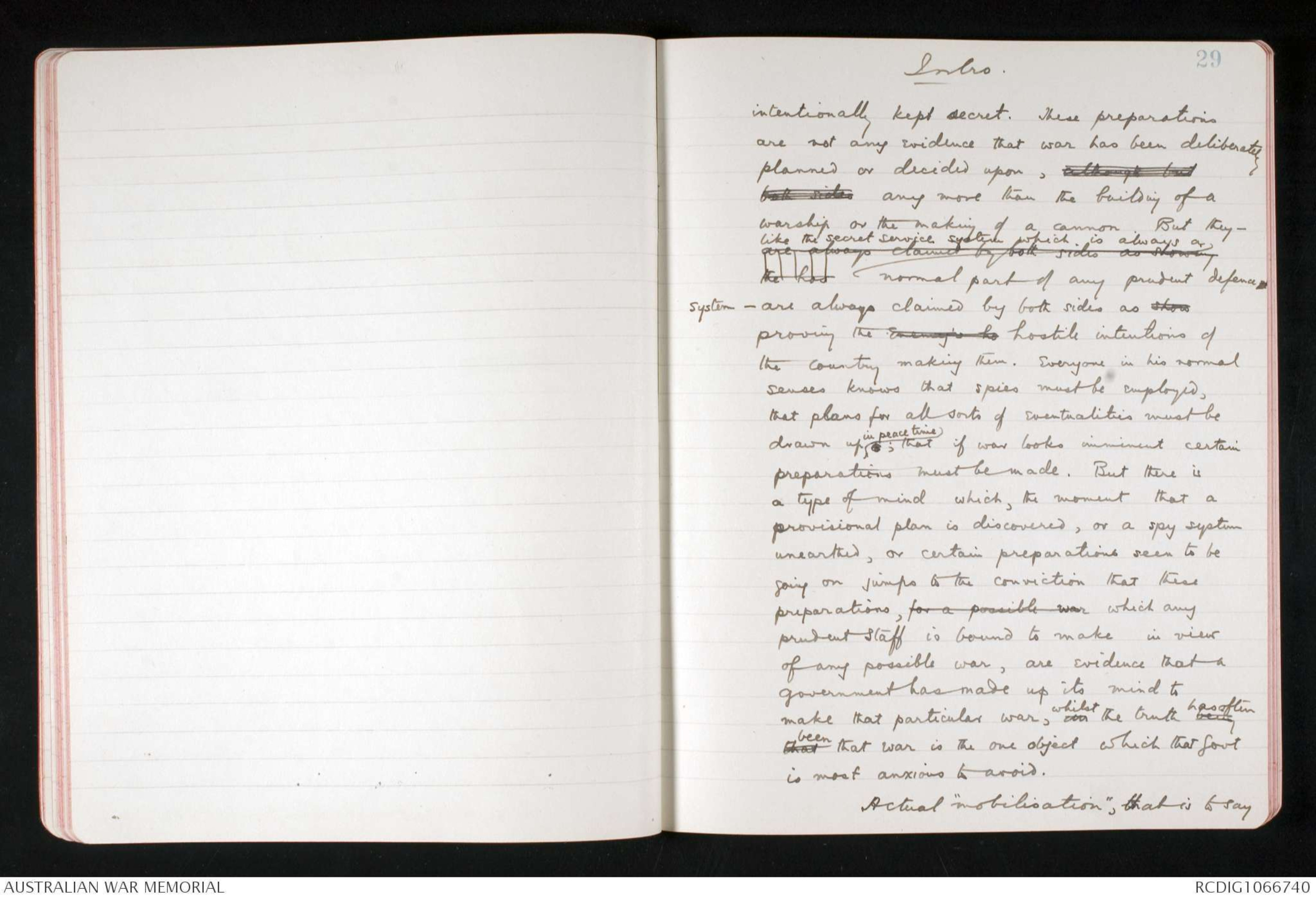
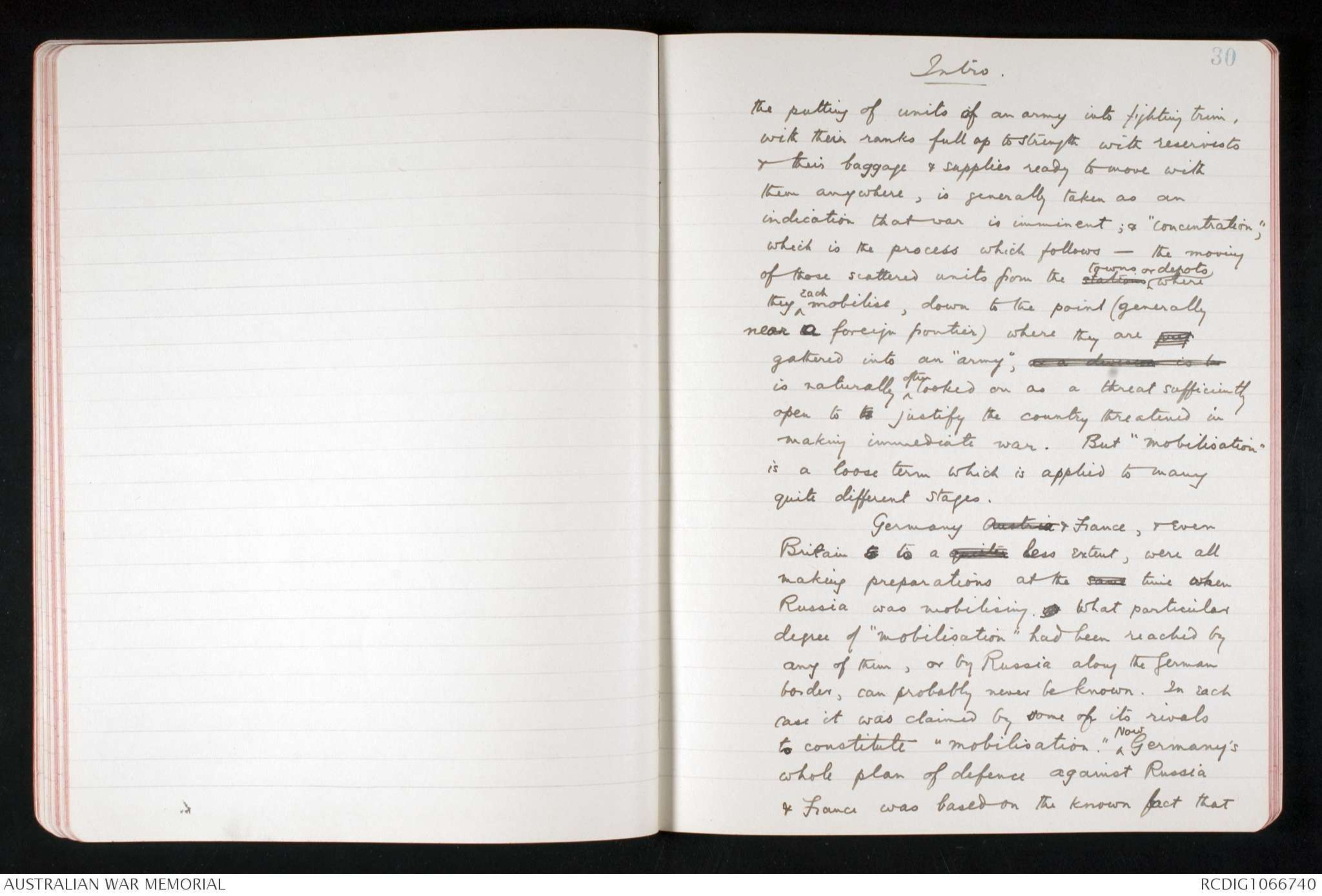
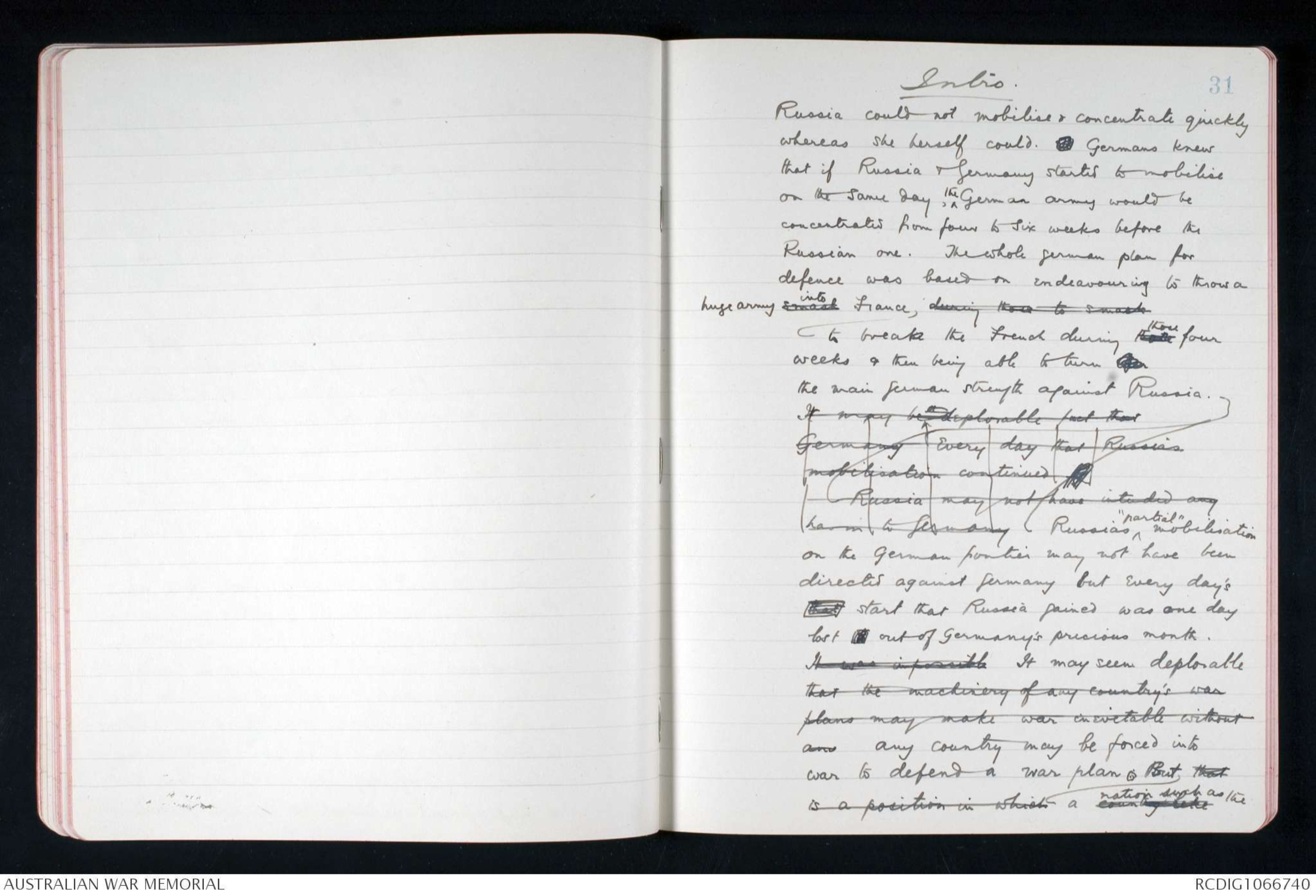
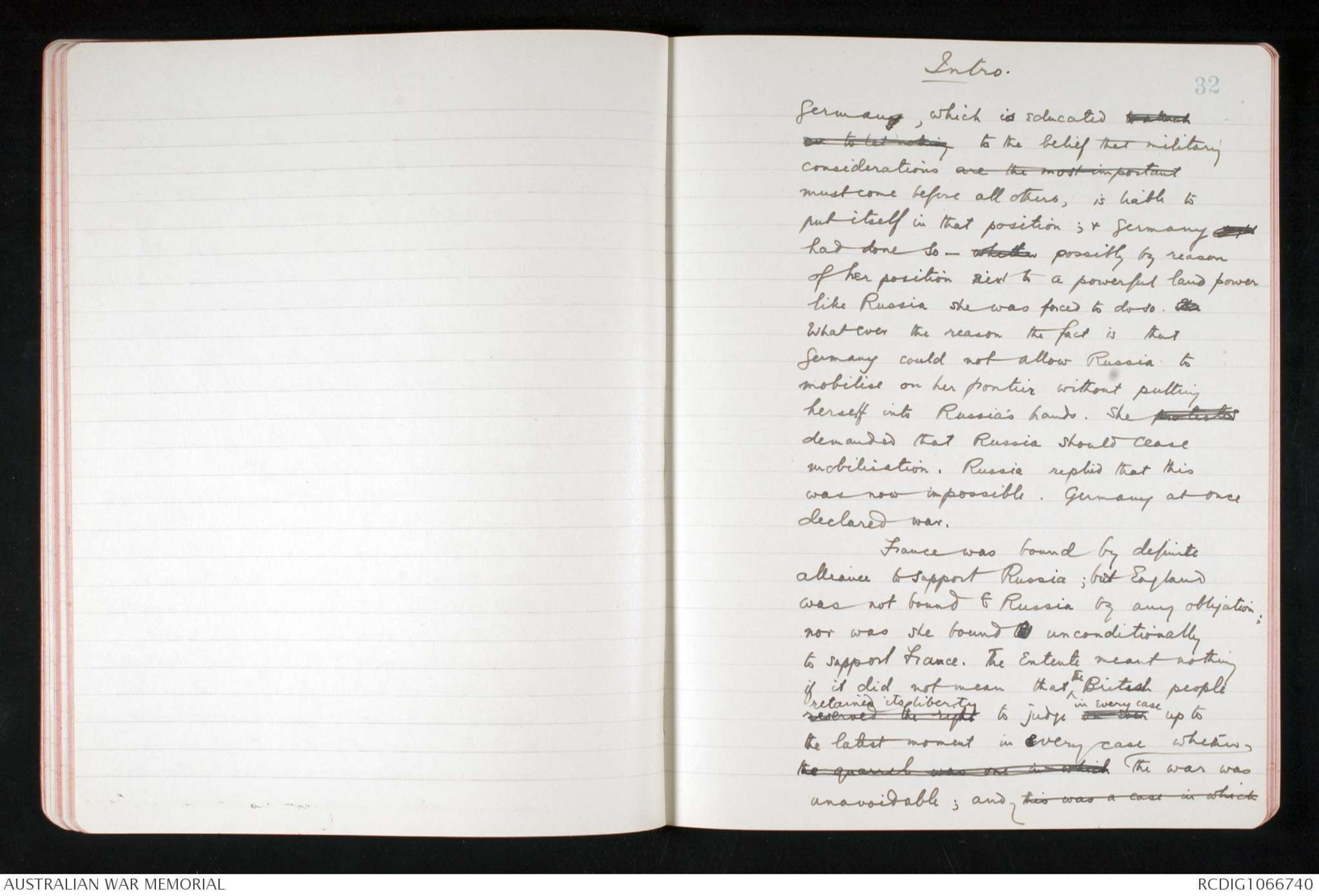
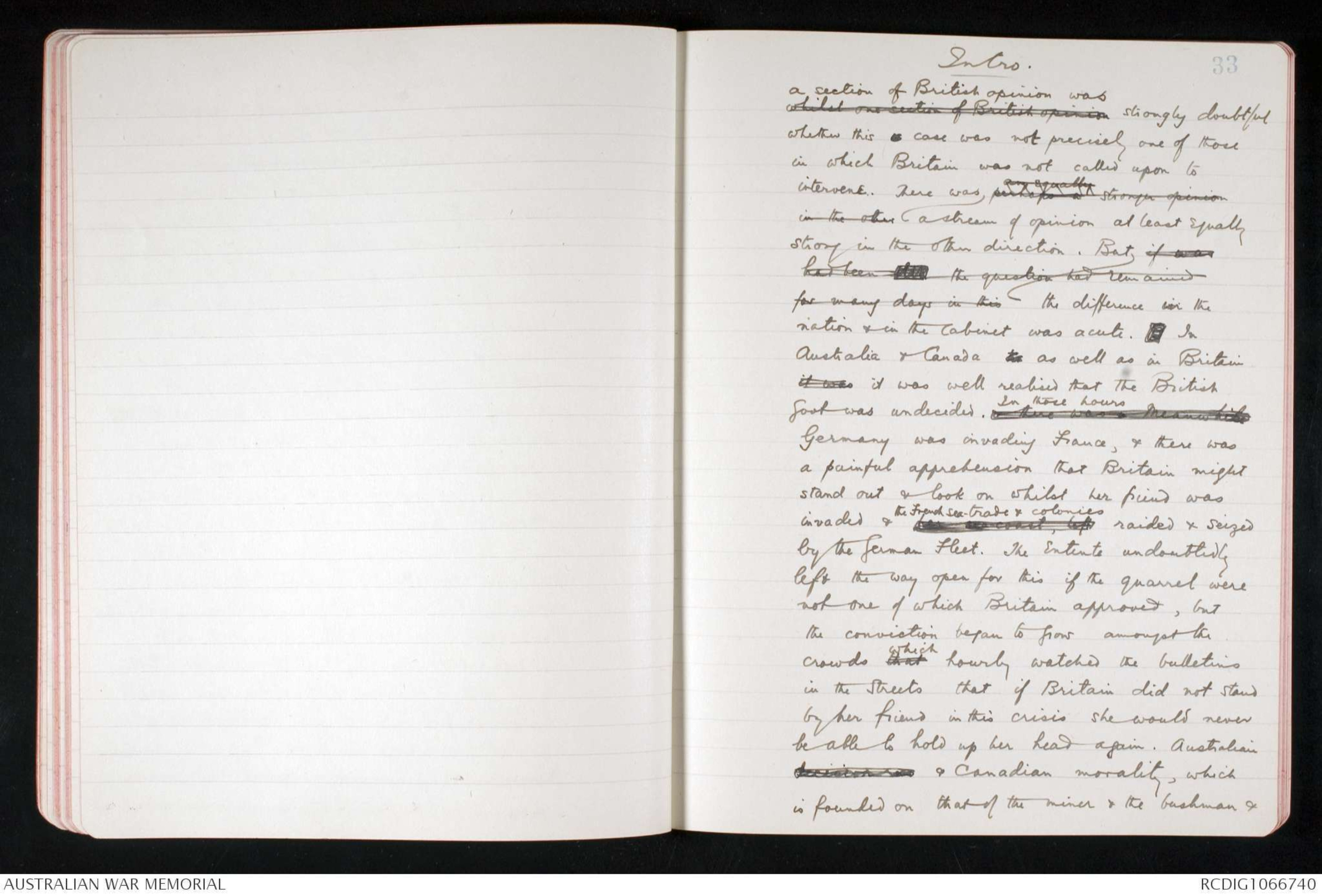
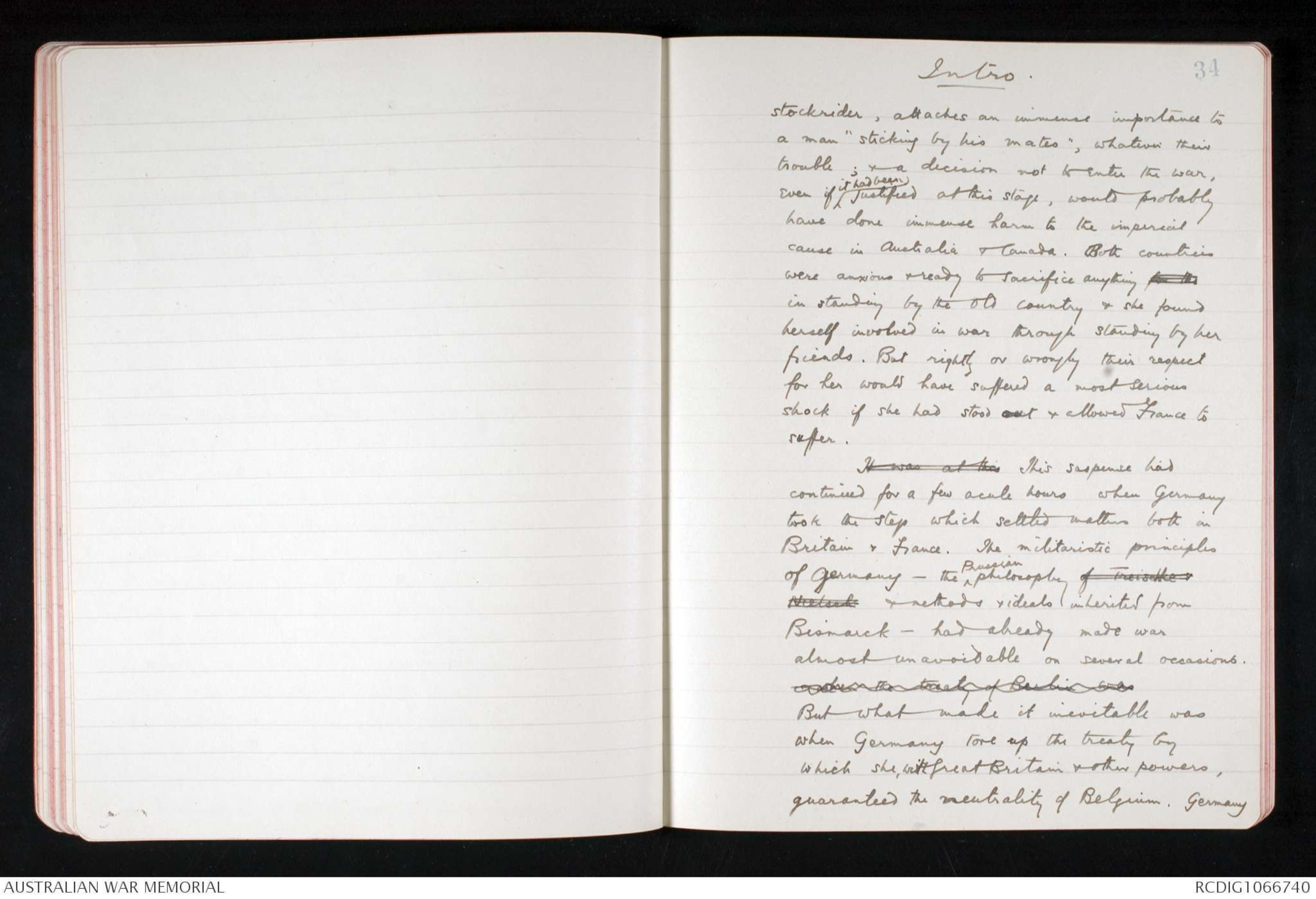
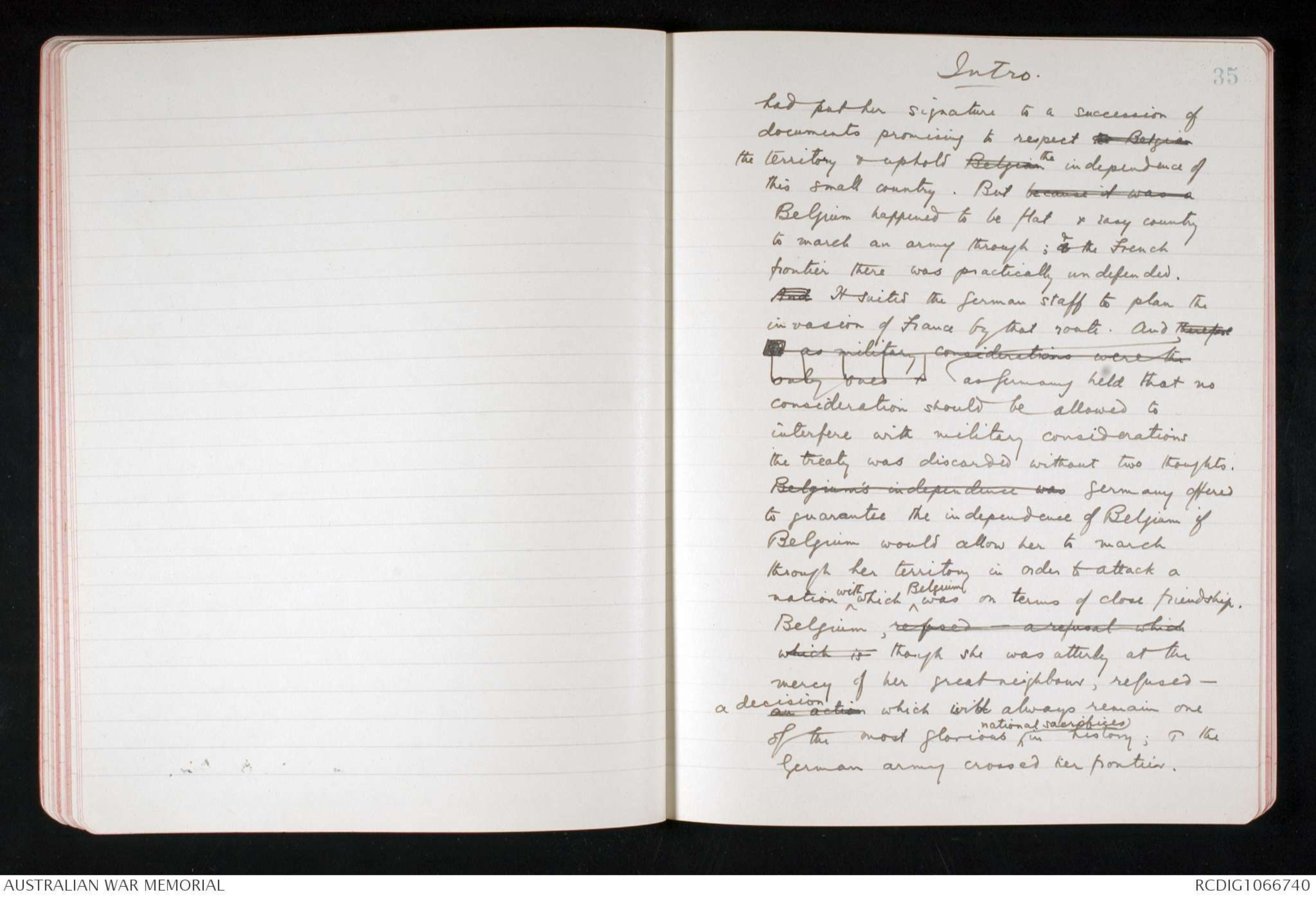
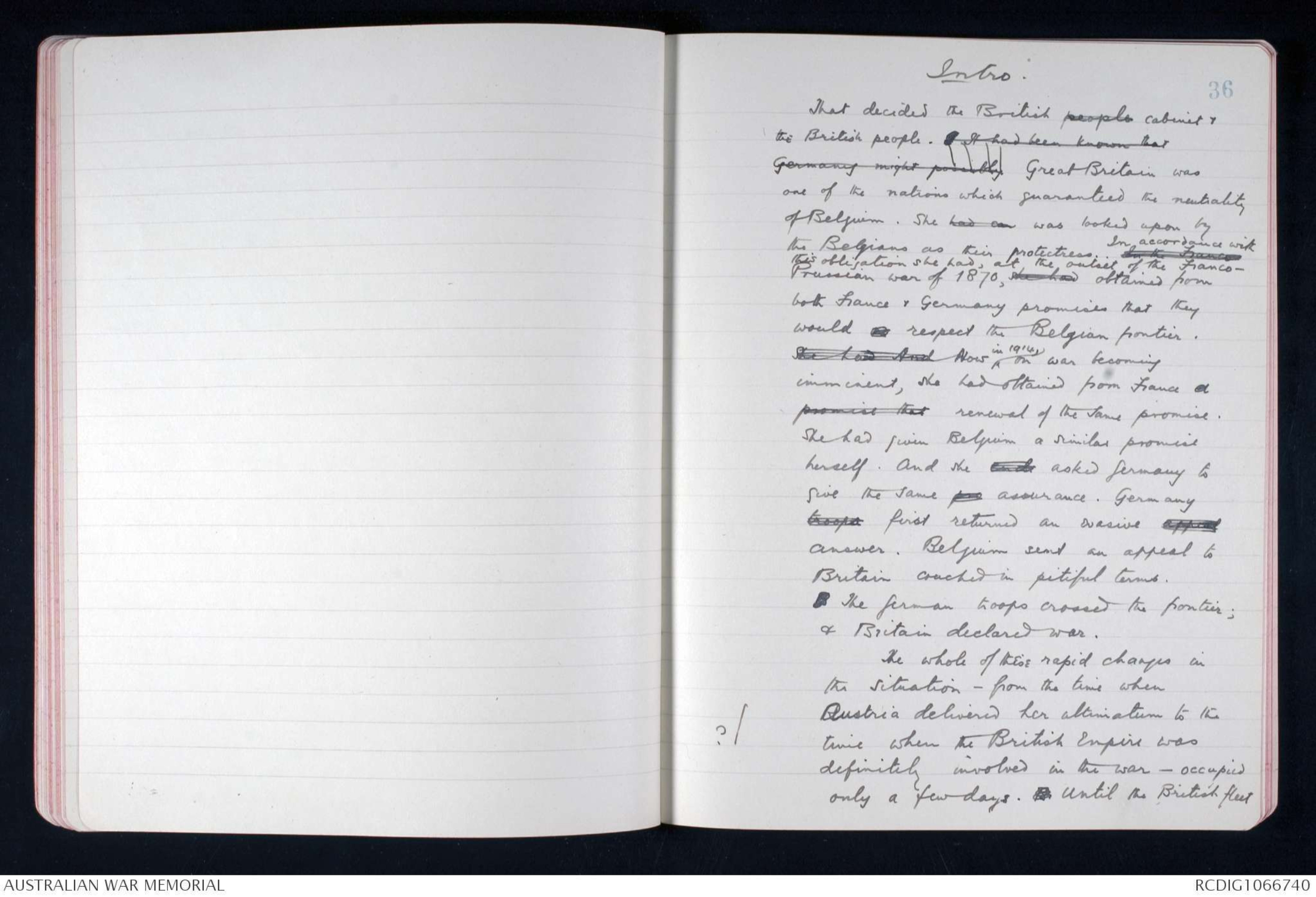
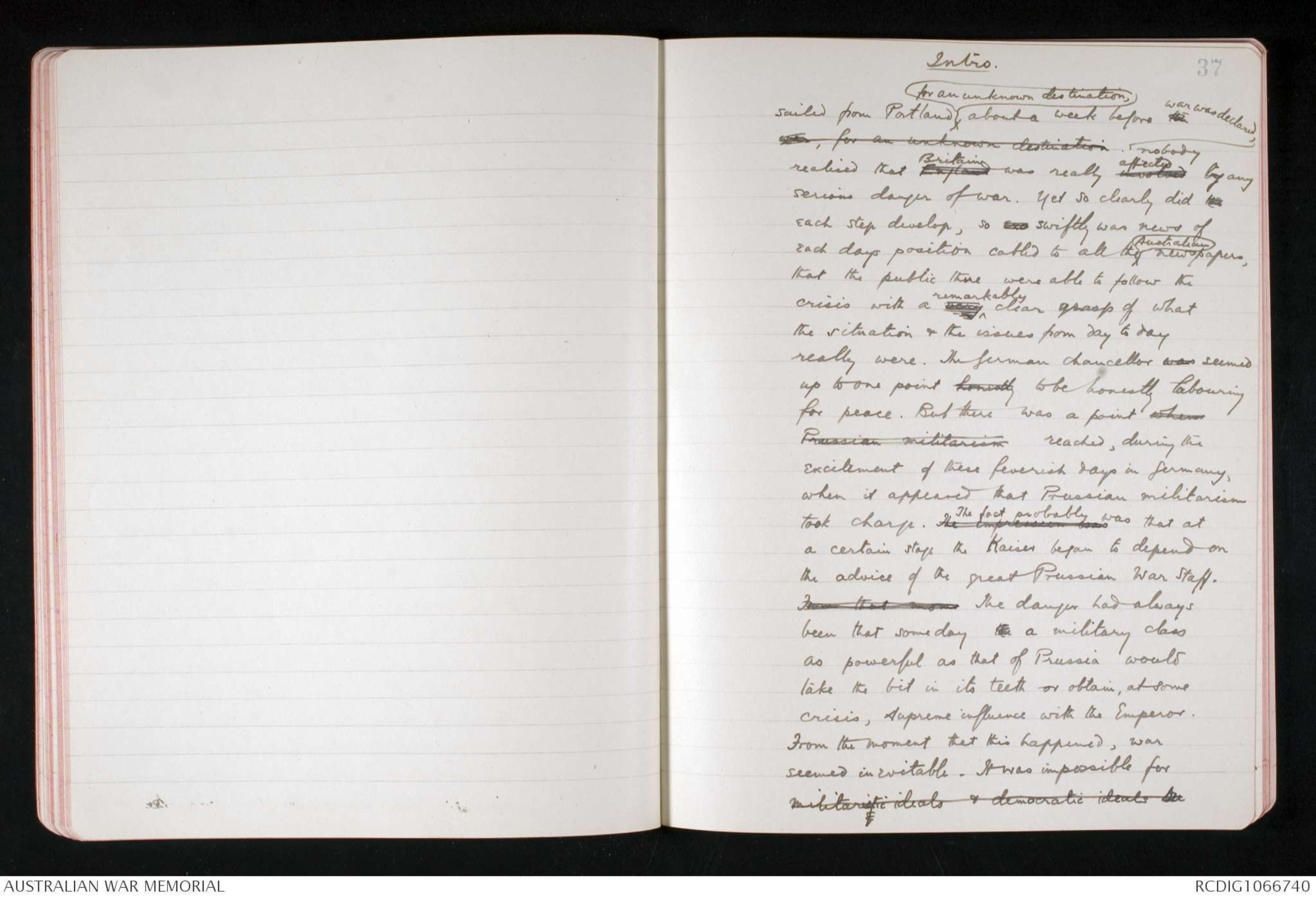
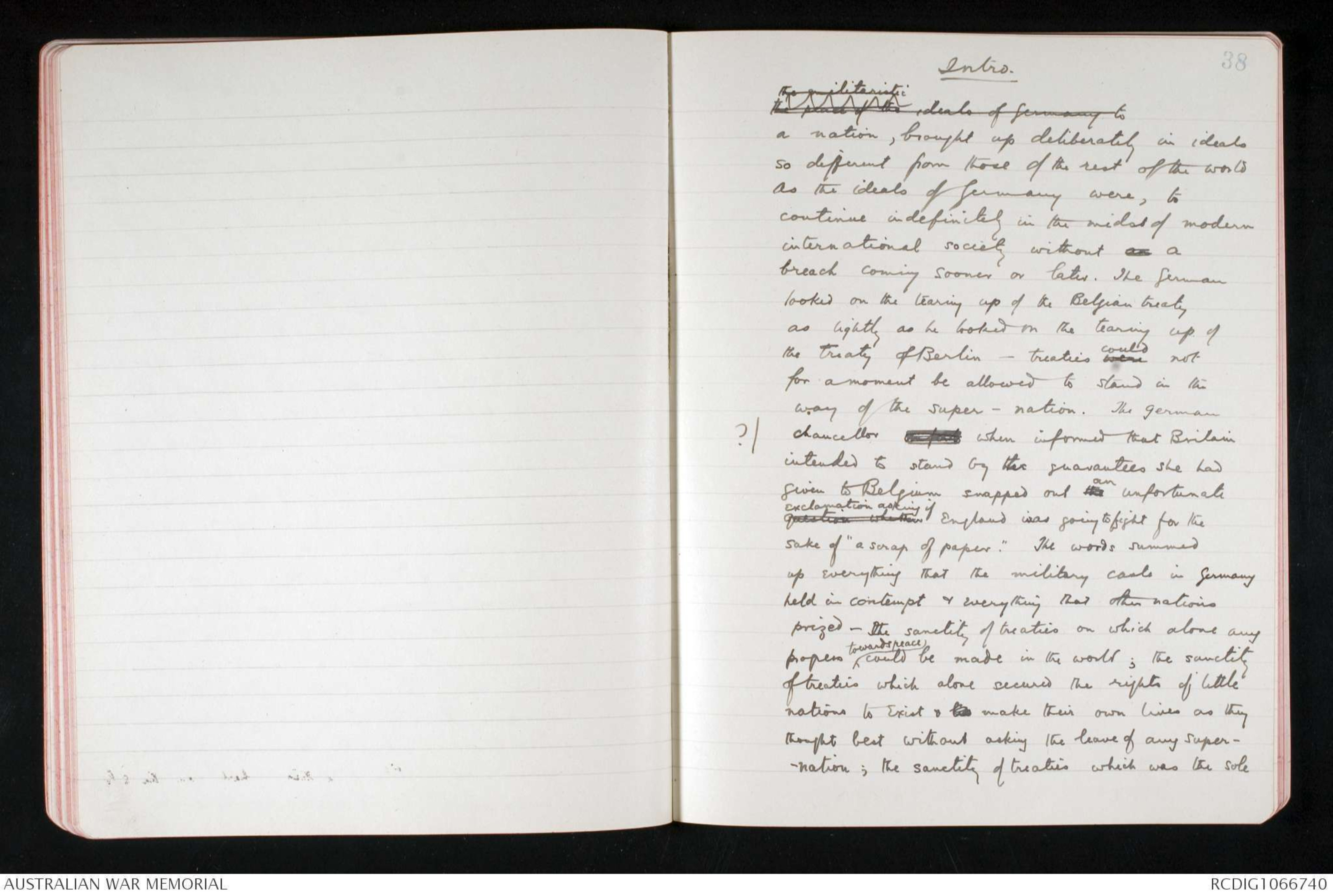
29
Intro.
intentionally kept secret. These preparations
are not any evidence that war has been deliberately
planned or decided upon, although but
both sides any more than the building of a
warship or the making of a cannon. But they -
are always claimed by both sides as showing
the has like the secret service system which is always a
normal part of any prudent defence x
system - are always claimed by both sides as show
proving the enemy's ho hostile intentions of
the country making them. Everyone in his normal
senses knows that spies must be employed,
that plans for all sorts of eventualities must be
drawn up ^in peace time x; that if war looks imminent certain
preparations must be made. But there is
a type of mind which, the moment that a
provisional plan is discovered, or a spy system
unearthed, or certain preparations seem to be
going on jumps to the conviction these
preparations, for a possible war which any
prudent Staff is bound to make in view
of any possible war, are evidence that a
government has made up its mind to
make that particular war, xxx whilst the truth being has often
that been that war is the one object which that Govt
is most anxious to avoid.
Actual "mobilisation", that is to say
30
Intro.
the putting of units of an army into fighting trim,
with their ranks full up to strength with reservists
& their baggage & supplies ready to move with
them anywhere, is generally taken as an
indication that war is imminent; & "concentration,"
which is the process which follows - the moving
of those scattered units from the stations ^towns or depots where
they ^each mobilise, down to the point (generally
near a foreign frontier) where they are prep
gathered into an "army" as a division is to
is naturally ^often looked on as a threat sufficiently
open to the justify the country threatened in
making immediate war. But "mobilisation"
is a loose term which is applied to many
quite different stages.
Germany Austria & France, & even
Britain x to a quieter less extent, were all
making preparations at the same time when
Russia was mobilising. xx What particular
degree of "mobilisation" had been reached by
any of them, or by Russia along the German
border, can probably never be known. In each
case it was claimed by some of its rivals
to constitute "mobilisation". ^Now Germany's
whole plan of defence against Russia
& France was based on the known fact that
31
Intro
Russia could not mobilise & concentrate quickly
whereas she herself could. xx Germans knew
that if Russia & Germany started to mobilise
on the same day, ^the German army would be
concentrated from four to six weeks before the
Russian one. The whole German plan for
defence was based on endeavouring to throw a
huge army smash into France during those to smash
to break the French during that those four
weeks & then being able to turn over
the main German strength against Russia.
It may be ^a deplorable fact that
Germany every day that Russias
mobilisation continued XXX
Russia may not have intended any
harm to Germany Russias ^"partial" mobilisation
on the German frontier may not have been
directed against Germany but every day's
that start that Russia gained was one day
lost xx out of Germany's precious month.
It was impossible It may seem deplorable
that the machinery of any country's war
plans may make war inevitable without
an any country may be forced into
war to defend a war plan. But that
is a position in which a country like a nation such as the
32
Intro.
Germany, which is educated to attach
one to let nothing to the belief that military
considerations are the most important
must come before all others, is liable to
put itself in that position; & Germany xxxx
had done so - whether possibly by reason
of her position next to a powerful land power
like Russia she was forced to do so. The
Whatever the reason the fact is that
Germany could not allow Russia to
mobilise on her frontier without putting
herself into Russia's hands. She protested
demanded that Russia should cease
mobilisation. Russia replied that this
was now impossible. Germany at once
declared war.
France was bound by definite
alliance to support Russia; but England
was not bound to Russia by any obligation
nor was she bound xxx unconditionally
to support France. The Entente meant nothing
if it did not mean that ^the British people
reserved the right retained its liberty to judge on even in every case up to
the latest moment in every case whether
the quarrel was one in which the war was
unavoidable; and this was a case in which
33
Intro.
which one section of British opinion a section of British opinion was strongly doubtful
whether this xx case was not precisely one of those
in which Britain was not called upon to
intervene. There was an equally perhaps a stronger opinion
in the other a stream of opinion at least equally
strong in the other direction. But if war
had been sxxx the question had remained
for many days in this the difference in the
nation & in the cabinet was acute. xx In
Australia & Canada to as well as in Britain
it was it was well realised that the British
Govt was undecided. & there was a? Meanwhile In those hours
Germany was invading France, & there was
a painful apprehension that Britain might
stand out & look on whilst her friend was
invaded & her sea coast, left the French sea-trade & colonies raided & seized
by the German Fleet. The Entente undoubtedly
left the way open for this if the quarrel were
not one of which Britain approved, but
the conviction began to flow amongst the
crowds that which hourly watched the bulletins
in the streets that if Britain did not stand
by her friend in this crisis she would never
be able to hold up her head again. Australian
decisionxxx & Canadian morality, which
is founded on that of the miner & the bushman &
34
Intro.
stockrider, attaches an immense importance to
a man "sticking by his mates", whatever their
trouble; & a decision not to enter the war,
even if ^it had been justified at this stage, would probably
have done immense harm to the imperial
cause in Australia & Canada. Both countries
were anxious & ready to sacrifice anything for the
in standing by the old country & she found
herself involved in war through standing by her
friends. But rightly or wrongly their respect
for her would have suffered a most serious
shock if she had stood out & allowed France to
suffer.
It was at this This suspense had
continued for a few acute hours when Germany
took the step which settled matters both in
Britain & France. The militaristic principles
of Germany - the ^Prussian philosophy of Triesetke &
Nietsche & methods & ideals inherited from
Bismarck - had already made war
almost unavoidable on several occasions.
& when the treaty of Berlin was
But what made it inevitable was
when Germany tore up the treaty by
which she, with Great Britain & other powers,
guaranteed the neutrality of Belgium. Germany
35
Intro.
had put her signature to a succession of
documents promising to respect the Belgian
the territory & uphold Belgian the independence of
this small country. But because it was a
Belgium happened to be flat & easy country
to march an army through; & the French
frontier there was practically undefended.
And It suited the German staff to plan the
invasion of France by that route. And thereforexxx as military considerations were the
only ones to as Germany held that no
consideration should be allowed to
interfere with military considerations
the treaty was discarded without two thoughts.
Belguim's independence was Germany offered
to guarantee the independence of Belgium if
Belgium would allow her to march
through her territory in order to attack a
nation ^with which ^Belgium was on terms of close friendship.
Belgium, refused - a refusal which
which is though she was utterly at the
mercy of her great neighbour, refused -
an action a decision which will always remain one
of the most glorious ^national sacrifices in history; & the
German army crossed her frontier.
36
Intro.
That decided the British people cabinet &
the British people. xx It had been known that
Germany might possibly Great Britain was
one of the nations which guaranteed the neutrality
of Belgium. She had an was looked upon by
the Belgians as their protectress. In the Franco In accordance with
this obligation she had, at the outset of the Franco-
Prussian war of 1870, she had obtained from
both France & Germany promises that they
would xx respect the Belgian frontier.
She had And Now ^in 1914 on war becoming
imminent, she had obtained from France a
promise that renewal of the same promise.
She had given Belgium a similar promise
herself. And she ends asked Germany to
give the same pro assurance. Germany
troops first returned an evasive appeal
answer. Belgium sent an appeal to
Britain couched in pitiful terms.
xxx The German troops crossed the frontier;
& Britain declared war.
The whole of these rapid changes in
the situation - from the time when
[*?I*] Austria delivered her ultimatum to the
time when the British Empire was
definitely involved in the war - occupied
only a few days. xxx Until the British fleet
37
Intro.
sailed from Portland ^for an unknown destination, about a week before the war was declared,
war, for an uknown destination. nobody
realised that England Britain was really involved affected by any
serious danger of war. Yet so clearly did the
each step develop, so exc swiftly was news of
each days position cabled to all the ^Australian newspapers,
that the public there were able to follow the
crisis with a very ^remarkably clear grasp of what
the situation & the issues from day to day
really were. The German chancellor was seemed
up to one point honestly to be honestly labouring
for peace. But there was a point when
Prussian militarism reached, during the
excitement of these feverish days in Germany,
when it appeared that Prussian militarism
took charge. The impression was The fact probably was that at
a certain stage the Kaiser began to depend on
the advice of the great Prussian War Staff.
From that mome The danger had always
been that someday the a military class
as powerful as that of Prussia would
take the bit in its teeth or obtain, at some
crisis, supreme influence with the Emperor.
From the moment that this happened, war
seemed inevitable. It was impossible for
militaristic ideals & democratic ideals xx
38
Intro.
the militaristic the peace of the ideals of Germany to
a nation, brought up deliberately in ideals
so different from those of the rest of the world
as the ideals of Germany were, to
continue indefinitely in the midst of modern
international society without an a
breach coming sooner or later. The German
looked on the tearing up of the Belgian treaty
as lightly as he looked on the tearing up of
the treaty of Berlin - treaties were could not
for a moment be allowed to stand in the
way of the super-nation. The German
[*?I*] chancellor in fact when informed that Britain
intended to stand by the guarantees she had
given to Belgium snapped out the an unfortunate
question whether exclamation asking if England was going to fight for the
sake of "a scrap of paper". The words summed
up everything that the military caste in Germany
held in contempt & everything that other nations
prized - the sanctity of treaties on which alone any
progress ^towards peace could be made in the world; the sanctity
of treaties which alone secured the rights of little
nations to exist & to make their own lives as they
thought best without asking the leave of any super -
nation; the sanctity of treaties which was the sole
 Lulu B
Lulu BThis transcription item is now locked to you for editing. To release the lock either Save your changes or Cancel.
This lock will be automatically released after 60 minutes of inactivity.